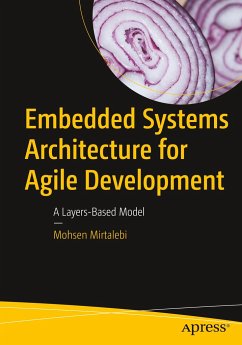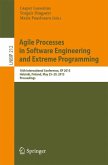Utilize a new layers-based development model for embedded systems using Agile techniques for software architecture and management. Firmware is comprised of both hardware and software, but the applicability of Agile in embedded systems development is new. This book provides a step-by-step process showing how this is possible.
The book details how the moving parts in embedded systems development affect one another and shows how to properly use both engineering tools and new tools and methods to reduce waste, rework, and product time-to-market. Software is seen not as a commodity but a conduit to facilitate valuable product knowledge flow across the company into the hands of the customer.
Embedded Systems Architecture for Agile Development starts off by reviewing the Layers model used in other engineering disciplines, as well as its advantages and applicability to embedded systems development. It outlines development models from project-based methodologies (e.g., collaborative product development) to the newer modern development visions (e.g., Agile) in software and various tools and methods that can help with a Layers model implementation. The book covers requirement modeling for embedded systems (Hatley-Pirbhai Method) and how adapting the HP Method with the help of the tools discussed in this book can be seen as a practical example for a complete embedded system.
What You'll Learn
Identify the major software parts involved in building a typical modern firmware
Assign a layer to each software part so each layer can be separate from another and there won't be interdependencies between them
Systematically and logically create these layers based on the customer requirements
Use Model-Based Design (MBD) to create an active system architecture that is more accepting of changes
Who This Book Is For
Firmware engineers; systems architects; hardware and software managers, developers, designers, and architects; program managers; project managers; Agile practitioners; and manufacturing engineers and managers. The secondary audience includes research engineers and managers, and engineering and manufacturing managers.
The book details how the moving parts in embedded systems development affect one another and shows how to properly use both engineering tools and new tools and methods to reduce waste, rework, and product time-to-market. Software is seen not as a commodity but a conduit to facilitate valuable product knowledge flow across the company into the hands of the customer.
Embedded Systems Architecture for Agile Development starts off by reviewing the Layers model used in other engineering disciplines, as well as its advantages and applicability to embedded systems development. It outlines development models from project-based methodologies (e.g., collaborative product development) to the newer modern development visions (e.g., Agile) in software and various tools and methods that can help with a Layers model implementation. The book covers requirement modeling for embedded systems (Hatley-Pirbhai Method) and how adapting the HP Method with the help of the tools discussed in this book can be seen as a practical example for a complete embedded system.
What You'll Learn
Identify the major software parts involved in building a typical modern firmware
Assign a layer to each software part so each layer can be separate from another and there won't be interdependencies between them
Systematically and logically create these layers based on the customer requirements
Use Model-Based Design (MBD) to create an active system architecture that is more accepting of changes
Who This Book Is For
Firmware engineers; systems architects; hardware and software managers, developers, designers, and architects; program managers; project managers; Agile practitioners; and manufacturing engineers and managers. The secondary audience includes research engineers and managers, and engineering and manufacturing managers.








